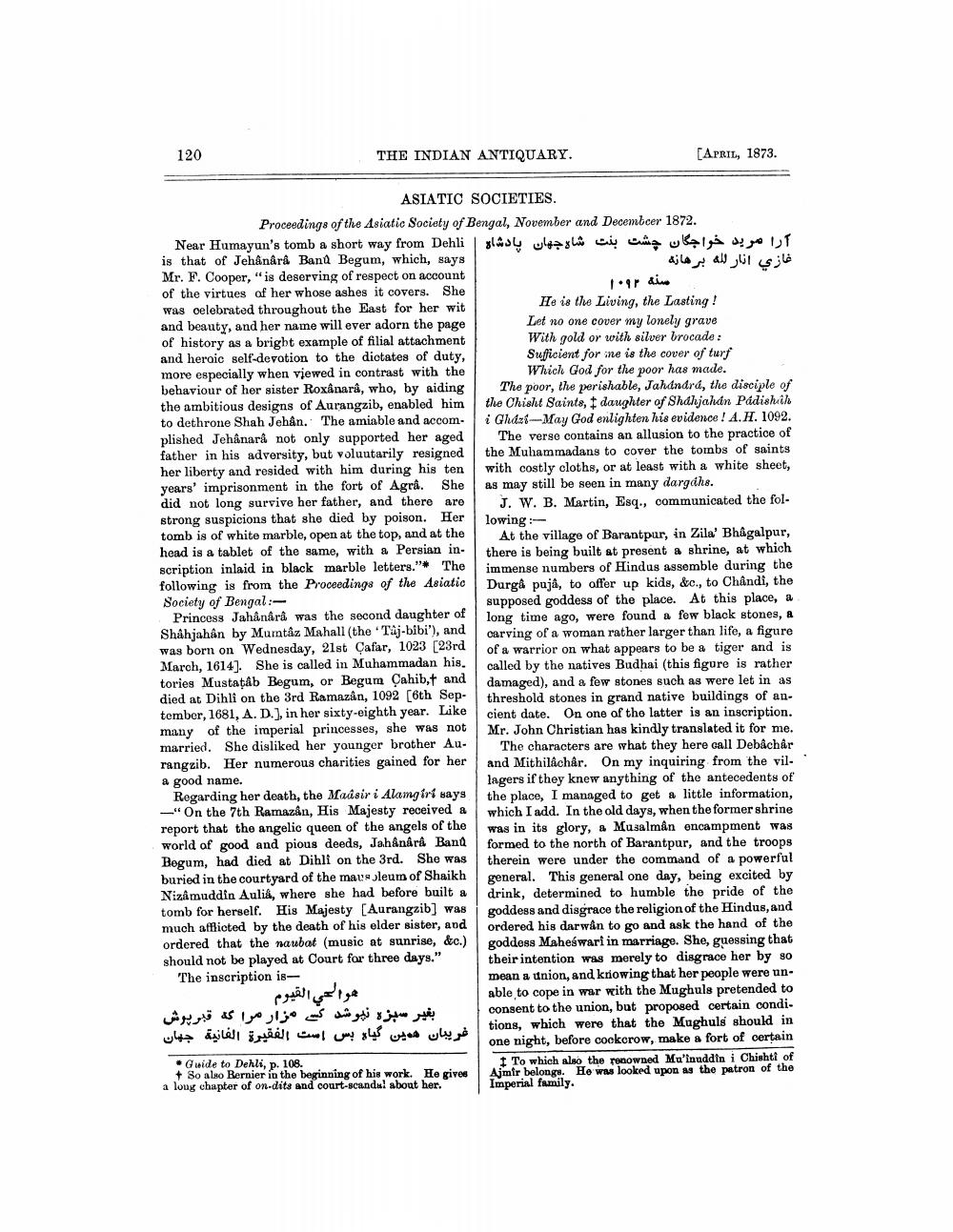________________
120
THE INDIAN ANTIQUARY.
ASIATIC SOCIETIES.
Proceedings of the Asiatic Society of Bengal, November and Decembeer 1872.
Near Humayun's tomb a short way from Dehli is that of Jehânârâ Banû Begum, which, says Mr. F. Cooper, "is deserving of respect on account of the virtues of her whose ashes it covers. She was celebrated throughout the East for her wit and beauty, and her name will ever adorn the page of history as a bright example of filial attachment and heroic self-devotion to the dictates of duty, more especially when viewed in contrast with the behaviour of her sister Roxânarâ, who, by aiding the ambitious designs of Aurangzib, enabled him to dethrone Shah Jehân. The amiable and accomplished Jehânarâ not only supported her aged father in his adversity, but voluutarily resigned her liberty and resided with him during his ten She years' imprisonment in the fort of Agrå. did not long survive her father, and there are strong suspicions that she died by poison. Her tomb is of white marble, open at the top, and at the head is a tablet of the same, with a Persian inscription inlaid in black marble letters." The following is from the Proceedings of the Asiatic Society of Bengal:
Princess Jahânârâ was the second daughter of Shahjahan by Mumtaz Mahall (the Taj-bibi'), and was born on Wednesday, 21st Cafar, 1023 [23rd March, 1614]. She is called in Muhammadan his. tories Mustaṭâb Begum, or Begum Çahib,t and died at Dihli on the 3rd Ramazân, 1092 [6th September, 1681, A. D.], in her sixty-eighth year. Like many of the imperial princesses, she was not married. She disliked her younger brother Aurangzib. Her numerous charities gained for her a good name.
Regarding her death, the Maisir i Alamgiri says "On the 7th Ramazân, His Majesty received a report that the angelic queen of the angels of the world of good and pious deeds, Jahânârâ Band Begum, had died at Dihli on the 3rd. She was buried in the courtyard of the mausoleum of Shaikh Nizamuddin Aulia, where she had before built a tomb for herself. His Majesty [Aurangzib] was much afflicted by the death of his elder sister, and ordered that the naubat (music at sunrise, &c.) should not be played at Court for three days." The inscription is
هو الحي القيوم
بغیر سبزه نپوشد کسے مزار مرا که قبر پوش غریبان همین گیاه بس است الفقيرة الفانية جهان
p.
108.
Guide to Dehli, So also Bernier in the beginning of his work. He gives a long chapter of on-dits and court-scandal about her.
[APRIL, 1873.
آرا مرید خواجگان چشت بنت شاه جهان پادشاه غازي اثار لله برهانه
سنه ۱۰۹۲
He is the Living, the Lasting!
Let no one cover my lonely grave With gold or with silver brocade: Sufficient for me is the cover of turf Which God for the poor has made.
The poor, the perishable, Jahandra, the disciple of the Chisht Saints, I daughter of Shahjahan Pádishih i Ghazi-May God enlighten his evidence! A.H. 1092.
The verse contains an allusion to the practice of the Muhammadans to cover the tombs of saints with costly cloths, or at least with a white sheet, as may still be seen in many dargahs.
J. W. B. Martin, Esq., communicated the following:
At the village of Barantpur, in Zila' Bhagalpur, there is being built at present a shrine, at which immense numbers of Hindus assemble during the Durga puja, to offer up kids, &c., to Chândi, the supposed goddess of the place. At this place, a long time ago, were found a few black stones, a carving of a woman rather larger than life, a figure of a warrior on what appears to be a tiger and is called by the natives Budhai (this figure is rather damaged), and a few stones such as were let in as threshold stones in grand native buildings of ancient date. On one of the latter is an inscription. Mr. John Christian has kindly translated it for me.
The characters are what they here call Debâchâr and Mithilâchâr. On my inquiring from the villagers if they knew anything of the antecedents of the place, I managed to get a little information, which I add. In the old days, when the former shrine was in its glory, a Musalmân encampment was formed to the north of Barantpur, and the troops therein were under the command of a powerful general. This general one day, being excited by drink, determined to humble the pride of the goddess and disgrace the religion of the Hindus, and ordered his darwân to go and ask the hand of the goddess Maheswari in marriage. She, guessing that their intention was merely to disgrace her by so mean a union, and knowing that her people were unable to cope in war with the Mughuls pretended to consent to the union, but proposed certain condi tions, which were that the Mughuls should in one night, before cockcrow, make a fort of certain
To which also the renowned Mu'inuddin i Chishti of Ajmir belongs. He was looked upon as the patron of the Imperial family.




